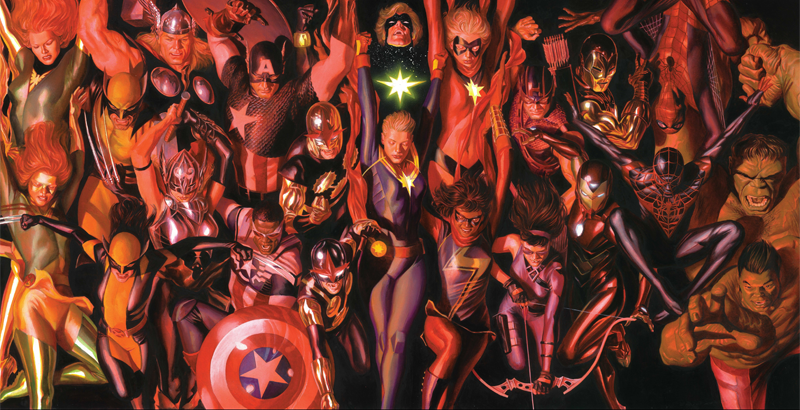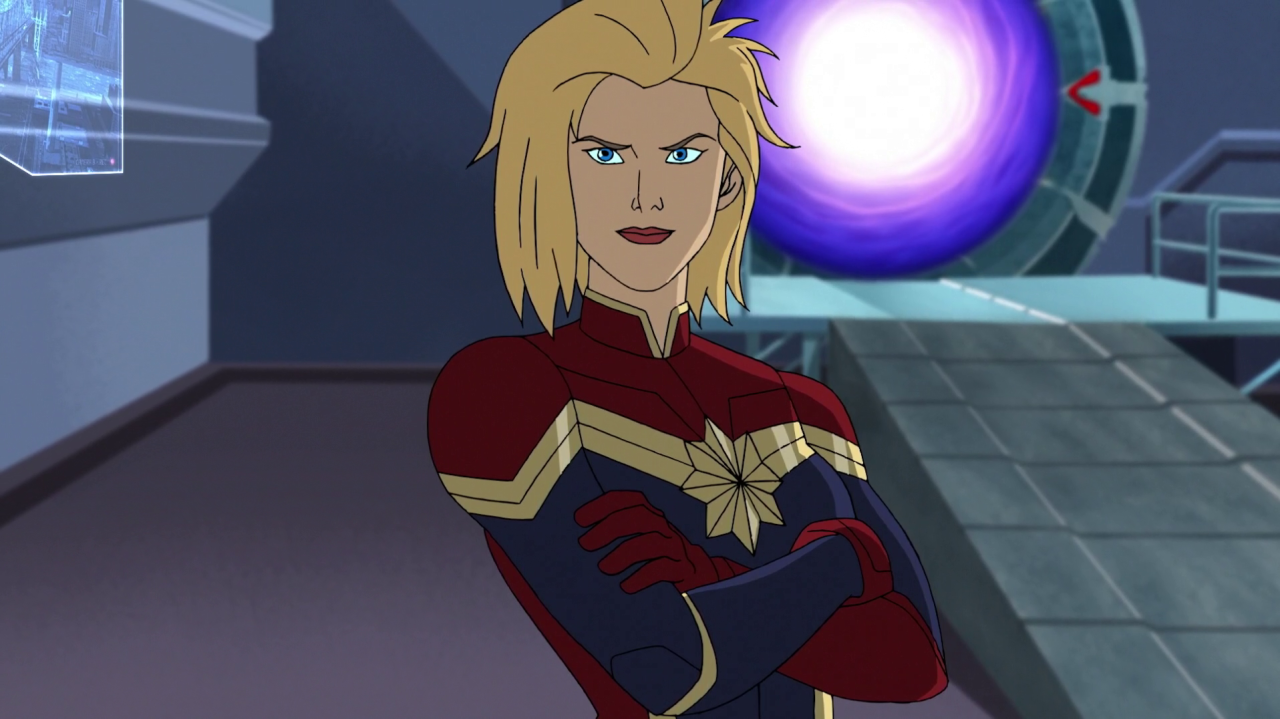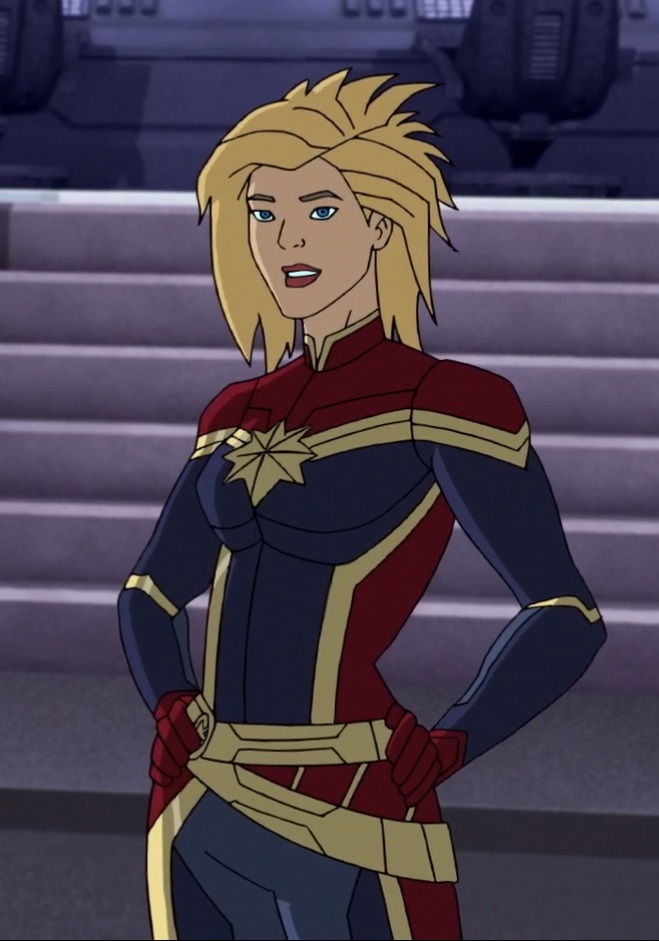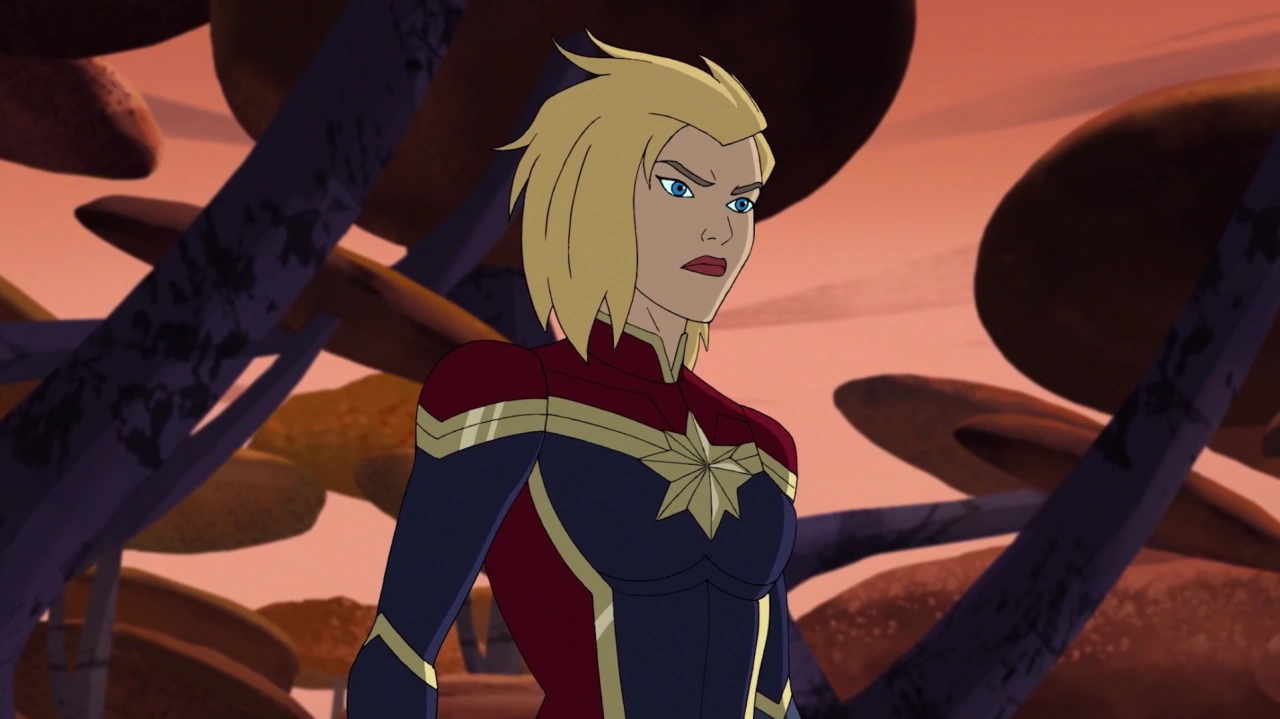Hey, readers! Did you happen to hear that Marvel’s comic book sales are declining? If you did not, then you probably missed what Marvel’s VP of Sales, Mr. David Gabriel, had to say about it. Read on to find out just what he said:
“What we heard was that people didn’t want any more diversity. They didn’t want female characters out there. That’s what we heard, whether we believe that or not. I don’t know that that’s really true, but that’s what we saw in sales. We saw the sales of any character that was diverse, any character that was new, our female characters, anything that was not a core Marvel character [sic], people were turning their nose up against. That was difficult for us because we had a lot of fresh, new, exciting ideas that we were trying to get out and nothing new really worked.” (Source: http://www.express.co.uk/entertainment/films/787249/Marvel-comics-diversity-Ironheart-Kamala-Khan-female-Thor-Iron-Man-Avengers-Infinity-War)
This is news Marvel apparently got from the retailers selling its comics. While some retailers saw an influx of new clientele, most saw a big drop as people ignored the new comics because their favorite characters – Captain America, Iron Man, Falcon, Hulk, Thor, etc. – were being killed off and/or humiliated, which means that their audience felt depressed and/or mortified. Marvel’s comic book sales have weakened in proportion to the steady stream of replacement, politically correct characters and stories the company has been trying to shove down our throats for the past three or four years.
I was astounded to see this statement from Mr. Gabriel. I have known for years that Marvel would lose revenue if it abused its audience by maltreating or destroying its characters. If you have followed my blog for a while, you know this is so. What surprised me was that a member of Marvel’s hierarchy actually admitted that sales were dropping because of the “new materiel” they were introducing. I told ‘em this was going to happen, but did they listen to me? ‘Course not. And now they are shocked that people do not want to buy comics that make fools of and/or destroy their favorite characters. Well surprise, surprise, surprise, Marvel! How could you have missed that fastball?
I can hear some of you fainting right now. You think I am an awful person for celebrating this news, no? That I hate women and diversity, too, n’est pas?
Well, no, I don’t. Allow me to explain what made me rejoice over Mr. Gabriel’s statement: what made me happy about his announcement was that he has finally admitted, on behalf of the company he serves, that politically correct characters are turning fans off of the Marvel franchise. He has finally acknowledged the obvious; that so-called “characters” like Jane Foster/Thorette, Amadeus Cho/New Hulk, Riri Williams/Ironheart, Kamala Khan/Ms. Marvel, and Gwen Stacey/Spider-Girl, along with other “new,” “diverse,” and “legacy” protagonists – which are supposedly “meant to bring women and minorities to the forefront of social consciousness” – are really hurting instead of helping Marvel’s brand.
So if I like what Mr. Gabriel had to say, then why am I writing this post? I am writing this post because he and his colleagues are missing the point of why their sales are falling. Mr. Gabriel says what they believe; that legions of Marvel’s fans hate women and diversity, and so they need to keep doing what they are doing in order to win their “deplorable” fans – you and me – over to their view of the world. In essence, they are accusing the thousands of people who support their business of widespread bigotry, intolerance, and stupidity; completely ignoring the beam in their own eye to pluck out the mote in ours.
This is what has Marvel fans so upset. This is why they have stopped buying the new comics. Marvel fans definitely do not hate diversity or women. The latter is proved by the fact that Marvel already has hundreds of established female characters with existing fanbases – although you would not know that if you were new to the Marvel multi-verse or have only heard about it from the mouths of twits (most comic book film critics). Go to my post “Offended, Insulted, and Not Shutting Up” for a roll of Marvel’s female characters and a link to a longer list where you can learn about more of them. The fact is that these reviewers could care less that Marvel has a panoply of female characters for the simple reason that it is not part of their agenda.
As for the idea that Marvel fans hate diversity, this is a laughable argument because it is so easily invalidated. Marvel has been diverse since it was founded, something that is shown through characters like Storm, Falcon, Black Panther, Misty Knight, and Luke Cage, all of whom are black. Separate sources have consistently claimed that either Black Panther or Falcon was the first black superhero to appear in comics, beating out DC’s Black Lighting. I think that Storm might predate the three of them, but I am not sure.
Quicksilver and the Scarlet Witch are Gypsies, readers. Red Wolf, Mirage, and Thunderbird are American Indians; and Colossus and the Black Widow are Russians who have become U.S. citizens. Then there is Nightcrawler, who is German and who barely resembles a human; Silverclaw, who is Brazilian; Sunfire, a Japanese man who follows the tradition of the samurai, and Bengal, a Vietnamese superhero who lives and works in Vietnam.
If Marvel were not diverse, readers, then these characters would never have been created by Stan Lee and the original writers. If Marvel’s fans hated diversity, none of these characters would have lasted more than one issue. Before 2015, they were all alive in the Marvel multi-verse, which means they have, collectively, been around for nearly seventy years. How can people who have kept these characters “alive” for so long hate diversity? Answer: they cannot, and therefore they do not, hate diversity.
So if Marvelites do not hate women or diversity, then why is Marvel losing revenue on its new comic books? Hmmmm…. Maybe these books are doing poorly because the fans, new and old, actually like Thor Odinson as the Prince of Thunder and not some prancing female using his hammer and claiming to be something she is manifestly not. Maybe fans truly liked Bruce Banner as The Incredible Hulk and really hate the fact that Marvel had one of his best friends kill him. Maybe fans are in fact more than a little bit upset by Marvel’s decision to make Steve Rogers a secret agent of HYDRA and a flaming NAZI. Maybe they genuinely like Tony Stark as the Invincible Armored Iron Man who can build his way out of a trap with a broken laptop and some chewing gum, instead of a fifteen year old science whizz-kid who could do her own thing instead of shoehorning herself into his act.
And maybe they do not like one of the first black superheroes – Falcon – being shoved into the role of Captain America, since it smacks of condescension and patronization. This move by Marvel is obviously meant to appease the PC police. And by doing this to the Falcon, Marvel’s writers are essentially stating that they think Sam Wilson – and therefore his fans – should not be satisfied that he is one of the first two black superheroes in comicdom. They would rather destroy the Falcon to make a new, “modern” Captain America that is anything BUT an American.
So maybe the reason sales are dropping is because fans think that pushing Falcon into Steve’s suit, handing him Rogers’ shield, and leaving him to spout anti-American claptrap like a ventriloquist’s dummy actually demeans African-Americans instead of “elevating” them or making Sam “more relevant” to the times.
Yeah, I think these facts may have more to do with your declining sales than sexism or racism, Mr. Gabriel. Too bad you and everyone else at Marvel have not realized this yet. Or, realizing it, you have decided that you know what we want because you are the “better and the brighter” of society and YOU are never wrong. We are just peons who cannot see the mote in our eye. That might be true, but you are missing the enormous beam in your own eye, buster.
So much for the customer is always right, eh, readers?
The reason I am writing all of this is because the people presently helming Marvel – and their enablers/cheerleaders in the world of critics – do not want more diversity or female characters. They want an emasculated male populace and homogeneity. They want black to be white, left to be right, and the population of the world to be nothing less than mental clones of them. Though they are doomed to failure, this does not mean that we can simply sit on the sidelines and let them ruin the Marvel universe(s). It means that we have to fight back against their dehumanizing push for sameness.
This leads me to another problem that Marvel is currently experiencing. An article at http://io9.gizmodo.com/marvel-vp-blames-women-and-diversity-for-sales-slump-1793921500 states that another reason for the drop in Marvel’s sales is due to the increasingly schizophrenic story arcs the company has been churning out for two years. I actually think this problem goes back to at least the Disassembled and House of M story lines. The reason I trace the problem back that far is this is when I noticed that Marvel was going off the rails. Disassembled and House of M may not have been the starting points, but they were the arcs which made me bite my lip and think, “@&*!, here we go with the death, despair, darkness, your-heroes-are-really-villains-in-disguise downward spiral.”
Just think about it, readers. After House of M the Marvel universe – which was originally upbeat, positive, and generally told decent to good stories – took a nosedive into the muck. After House of M we were fed the atrociously immoral and disgusting “Ultimate Universe.” Then we were handed the insipid “New Avengers” storyline and endured the advent of the largely lukewarm “Young Avengers” crew. We were handed the demoralizing Civil War arc next. Then we had the sickening Avengers vs. X-Men event; the asinine “Unity Squad” story line, and the Original Sin plotline which led to the putrid rewrite of the Marvel universe(s) in the Secret Wars event of 2015.
According to Beth Elderkin, the writer of the article at io9.gizmodo.com, there have been “at least 12 events and crossovers [in the past two years]. Events, in particular, have become more of a chore than a reward. There’s little build-up or anticipation because you know another one’s right around the corner. They also can completely screw over beloved characters for the sake of drama, like turning Captain America into a fascist as Sam Wilson has taken [on] his mantle.”
She says this makes it hard for new readers to focus, and I will not argue that these endless events do not help new fans to get their footing in the Marvel multi-verse – or, rather, what is left of it. But the problem she does not address is that none of these events or crossovers is positive. These stories are all negative and thus display brazenly the idea that Marvel’s management, who believe themselves the “best and the brightest” (but are truly the dumb and the dimmest), know what’s best for the rest of us. They also continue to drive the homogeneity mantra onto readers’ minds like a suffocating pillow. Not one of these events leaves a reader feeling uplifted and ready to face the world again. How do I know this?
Because that is what simply reading descriptions of these story arcs did and still does to me. And I am not alone, something which Mr. Gabriel’s admission about moribund comic book sales proves. Every last one of the story arcs I listed above may be compelling and addictive to some readers, but to most of us they reek of negativity, despair, and nihilism. How many people want to stew in an emotional/mental/spiritual refuse pile like this? If the downturn in Marvel’s comic book sales is as steep as Mr. Gabriel seems to believe it is, then I think I am safe in saying that ninety percent of normal, everyday people do not want this junk. This means that Marvel is selling to a narrow market which is shrinking day by day.
But why is Marvel having this problem at all? If the difficulty is too many dispiriting events, the company could easily fix the problem by turning the characters over to new authors, right? Possibly, but from what Beth Elderkin says this entire problem is born of the fact that “….There’s been a steady decline in Marvel’s talent pool, because of better offers and independent retailers. One retailer mentioned at the summit that it’s especially hard to keep talented writers and artists when they can make creator-owned books at publishers like Image. Not only does it give them more flexibility to tell the stories they want, but they also keep way more of the revenue.”
Again, I will not argue with her. Though I have no idea what Marvel pays its artists and writers, I do know that the writers they are allowing free reign in their universe(s) at the moment should not be allowed anywhere near a keyboard or a pen. The “stories” that many of these writers are pumping out are evidence that they are intellectual hamsters running inside fetishified exercise wheels decorated with death’s heads.
So finding new writers for Marvel who have positive attitudes and a love of truth, beauty, and goodness is going to be a challenge. Believing that Marvel would hire these people seems to be asking for a miracle. And if Marvel currently has writers who want to tell true, good, and beautiful stories with their characters, these writers appear to be few and far between. And these people are either barely hanging on to their jobs or they have left for greener pastures.
“All right, Mithril,” some of you say, “if these are the problems, just what are we supposed to do about them? Marvel is a big company and they won’t let just anyone in. They specifically tell aspiring artists and storytellers, ‘Don’t call us, we’ll call you.’ How are we going to fix a company that doesn’t want to be fixed?”
Good question. There are several options available to fans, readers. If you are like me and my friends, and you do not like the stories which Marvel is publishing, keep doing what you have been doing: avoid their new comics like the plague. This means that their sales will keep plummeting and they will, sooner or later, be forced to clean up their act in order to stay in business. Or they will finally hire people who will do this service for us. Either way, remember that money talks. If your money is not going into their pockets, then the silence will get their attention.
Another option is to become a writer yourself. If you write good stories and books and they sell well, are positively reviewed, and have the masses talking with mouths and wallets, then Marvel will probably notice you. Then maybe – just maybe – you will get lucky and they will tap you to write for them.
If you do manage to accomplish this feat, then I would add the caveat that you do your best to keep your eye on the prize. Put your slippers under your bed, as Denzel Washington advised, so that you always have to kneel down to get them in the morning. You got where you are by telling good, true, and beautiful stories, and this is what you want to do with Marvel’s heroes. Keep that goal in mind and you should be fine.
If you are not much of a storyteller, and you are already speaking by not buying Marvel’s comics, then you can always write letters to Marvel in order to explain your displeasure with them. This is what I do; I watch Marvel’s movies, read the older comics, and critique the cartoons. Besides blogging about the characters I enjoy as much as I can, I also write letters to Marvel’s top echelons, telling them what I think of their new comics (and I don’t think much of them).
You can do this, too, readers. Marvel has five different email addresses where you can send letters, as well as a section for general feedback on their website. I have never gone that route, so I cannot tell you what to expect if you try it. However, if you write letters to Marvel, put OKAY TO PRINT alongside your email’s subject heading and send it to one or all of the following addresses: onlinesupport@marvel.com, spideyoffice@marvel.com, officex@marvel.com, mheroes@marvel.com, and/or mondomarvel@marvel.com. And do not be threatening when you write to them. Believe me; they will notice your letters, even if they are politely phrased.
The squeaky wheel gets the grease, and we Marvel fans have more right to be squeaky than that posse of small-minded critics and “cultural gatekeepers” do. Unless these people actually buy Marvel’s comics in droves (which they very obviously do not), they are not the audience the company has to please. It was our money that made Marvel what it is today, not the critics’ pens. I say it is high time we reminded Marvel of this fact.
For myself, I will continue to do all of the above. I know I sound as though I am crusading against Marvel’s hierarchy, and I guess I am, after a fashion. But I am doing so as a customer who desperately wants to preserve an enjoyed and admired product, so that I can pass it on to others to enjoy in the future.
I want to be entertained by Marvel for many more years, readers. Right now, they are not entertaining me OR legions of their fans. They are trying to force their view of the world on us through these “new,” PC characters, destroying the good and great and true ones in the process. That is cultural bullying, which is a form of intellectual tyranny. It must be stopped. The only way that we can convince Marvel’s management to right the ship is to tell them why we are not buying their product. But we have to actually tell them if we are to have any hope of returning Marvel Comics to the good, the great, and the true, which is timeless.
Until next time, readers….EXCELSIOR!!!!

























